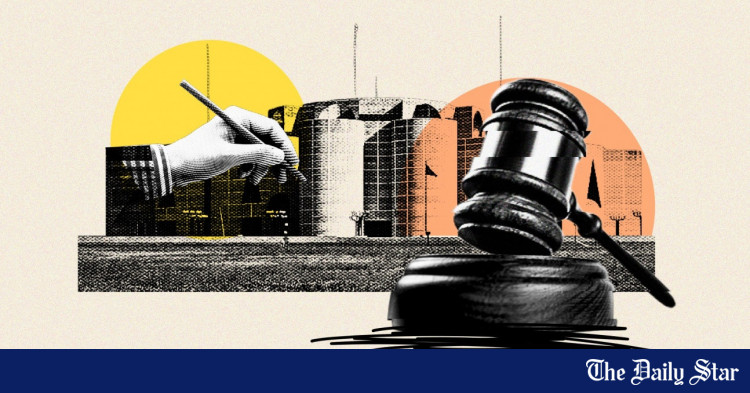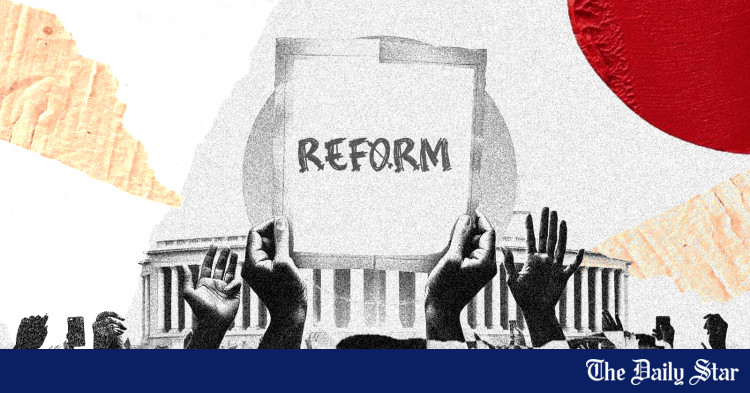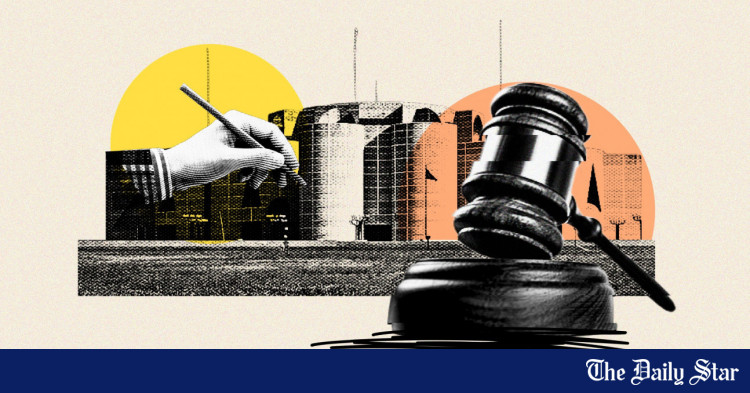Saif
Senior Member
- Joined
- Jan 24, 2024
- Messages
- 17,389
- Likes
- 8,373
- Nation

- Residence

- Axis Group


Constitution reform commission proposes new principles for Bangladesh
Equality, human dignity, social justice, pluralism will replace nationalism, socialism, secularism
Constitution reform commission proposes new principles for Bangladesh
Equality, human dignity, social justice, pluralism will replace nationalism, socialism, secularism

Photo: CA Press Wing
Highlights:
Equality, human dignity, social justice, pluralism will replace nationalism, socialism, secularism
Photo: CA Press Wing
Highlights:
- Include equality, human dignity, social justice, pluralism, and democracy in the preamble; remove nationalism, socialism, and secularism.
- Create a bicameral parliament with a National Assembly and Senate, each having four-year terms for better representation.
- Establish a National Constitutional Council to balance state powers and oversee key constitutional appointments transparently.
- Limit the Prime Minister to two terms, enable no-confidence motions, and amend Article 70 to reduce unilateral authority.
- Decentralise judiciary with permanent High Court benches in divisional cities; strengthen local governance with a Local Government Commission.
The Constitution Reform Commission's report, submitted to the Chief Adviser Prof Muhammad Yunus, proposed including equality, human dignity, social justice, and pluralism in its preamble while removing nationalism, socialism, and secularism. Democracy, which is already a constitutional principle, will remain so.
The commission, led by Prof Ali Riaz, also proposed reinstating the provision for a referendum to amend the constitution.
The commission has recommended introducing a bicameral parliament to ensure representation for all, with a lower house (called the National Assembly) based on majority representation and an upper house (called the Senate) based on proportional representation. Both houses will have a term length of four years, meaning the government and the Prime Minister's term will also be four years.
The commission believes that one of the main reasons for the autocratic authoritarianism Bangladesh has faced over the past 16 years is the absence of an institutional power balance.
To prevent the concentration of power in the hands of an individual or institution, the commission has proposed the creation of a constitutional body named the National Constitutional Council to establish a system of checks and balances between the three branches of the state and the two executive positions — the Prime Minister and the President.
This council would include the President, the Chief Justice, the Prime Minister and Leader of the Opposition (both elected through the Parliament), the Speakers of both houses, Deputy Speakers from the opposition, and a representative of other parties.
The commission believes this institution would ensure transparency and accountability in the appointment process as a constitutional body.
The commission said, "It is evident that the unilateral powers of the Prime Minister must be reduced. To prevent the Prime Minister from unilaterally appointing heads of constitutional institutions, including the Election Commission and the armed forces, these powers should be vested in the National Constitutional Council."
The commission has recommended reforms to ensure that the Prime Minister can face a no-confidence motion in Parliament. It has also proposed amending Article 70 to prevent the Prime Minister from being entirely shielded by it.
The commission also recommended imposing a two-term limit on the Prime Minister's tenure.
The commission has provided a framework for an interim government to be formed after the dissolution of parliament and recommended that the selection of advisers to such governments should not rest with any individual or single institution. Instead, it suggested that this responsibility be given to the National Constitutional Council.
To ensure justice and accessibility for all, the commission has recommended decentralising the judiciary. It proposed maintaining the unitary structure of the Supreme Court while establishing permanent High Court benches with jurisdiction in all divisional cities.
The commission emphasised the importance of a strong local government system and recommended forming a Local Government Commission. It also suggested establishing coordination councils at the district and city corporation levels.
Additionally, the commission advocated for expanding the scope of fundamental rights and ensuring their constitutional protection through a comprehensive charter.
It proposed revising the current method of electing the President, which reflects individual preferences and suggested electing the President through an electoral college. The commission proposed that the President's term should be four years long.
While submitting the recommendations, the commission's chairman, Prof Ali Riaz, expressed hope that political parties would reach a consensus.
The commission, led by Prof Ali Riaz, also proposed reinstating the provision for a referendum to amend the constitution.
The commission has recommended introducing a bicameral parliament to ensure representation for all, with a lower house (called the National Assembly) based on majority representation and an upper house (called the Senate) based on proportional representation. Both houses will have a term length of four years, meaning the government and the Prime Minister's term will also be four years.
The commission believes that one of the main reasons for the autocratic authoritarianism Bangladesh has faced over the past 16 years is the absence of an institutional power balance.
To prevent the concentration of power in the hands of an individual or institution, the commission has proposed the creation of a constitutional body named the National Constitutional Council to establish a system of checks and balances between the three branches of the state and the two executive positions — the Prime Minister and the President.
This council would include the President, the Chief Justice, the Prime Minister and Leader of the Opposition (both elected through the Parliament), the Speakers of both houses, Deputy Speakers from the opposition, and a representative of other parties.
The commission believes this institution would ensure transparency and accountability in the appointment process as a constitutional body.
The commission said, "It is evident that the unilateral powers of the Prime Minister must be reduced. To prevent the Prime Minister from unilaterally appointing heads of constitutional institutions, including the Election Commission and the armed forces, these powers should be vested in the National Constitutional Council."
The commission has recommended reforms to ensure that the Prime Minister can face a no-confidence motion in Parliament. It has also proposed amending Article 70 to prevent the Prime Minister from being entirely shielded by it.
The commission also recommended imposing a two-term limit on the Prime Minister's tenure.
The commission has provided a framework for an interim government to be formed after the dissolution of parliament and recommended that the selection of advisers to such governments should not rest with any individual or single institution. Instead, it suggested that this responsibility be given to the National Constitutional Council.
To ensure justice and accessibility for all, the commission has recommended decentralising the judiciary. It proposed maintaining the unitary structure of the Supreme Court while establishing permanent High Court benches with jurisdiction in all divisional cities.
The commission emphasised the importance of a strong local government system and recommended forming a Local Government Commission. It also suggested establishing coordination councils at the district and city corporation levels.
Additionally, the commission advocated for expanding the scope of fundamental rights and ensuring their constitutional protection through a comprehensive charter.
It proposed revising the current method of electing the President, which reflects individual preferences and suggested electing the President through an electoral college. The commission proposed that the President's term should be four years long.
While submitting the recommendations, the commission's chairman, Prof Ali Riaz, expressed hope that political parties would reach a consensus.
Last edited:









































